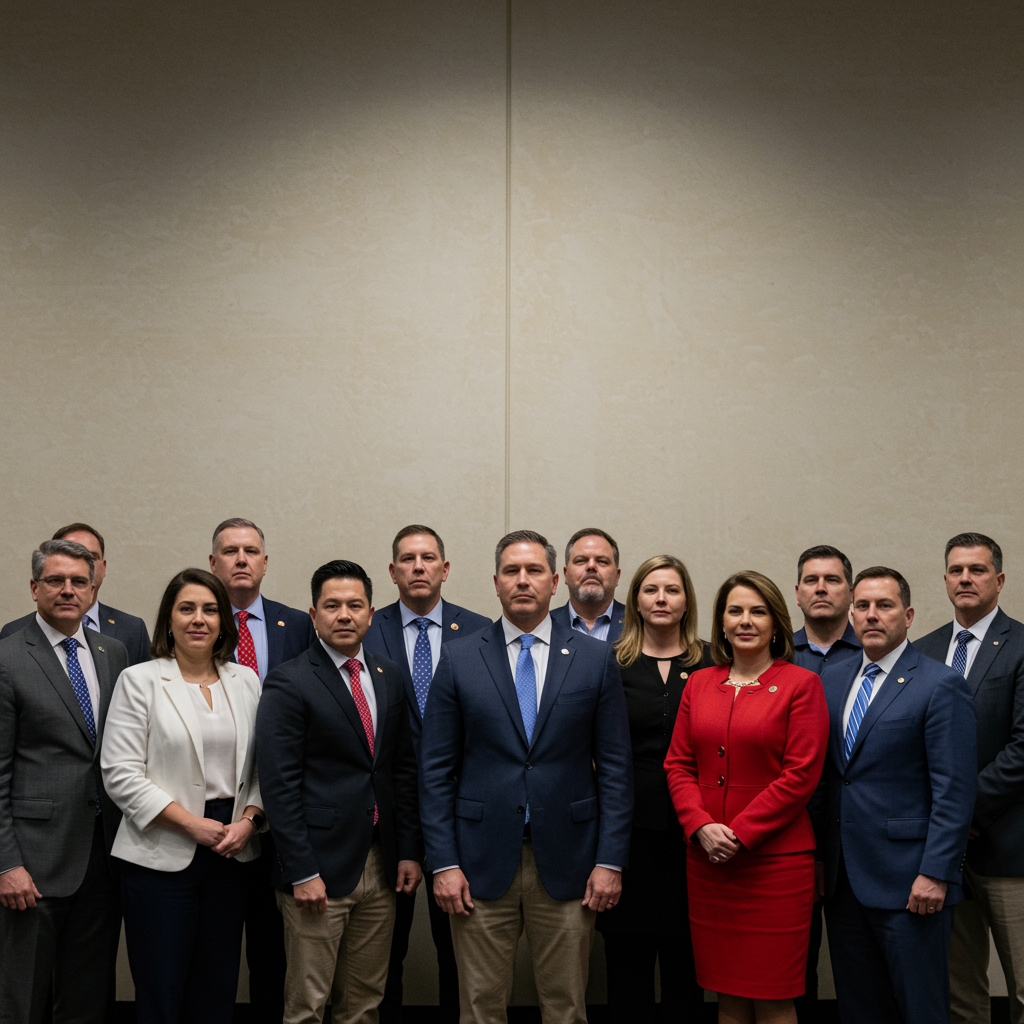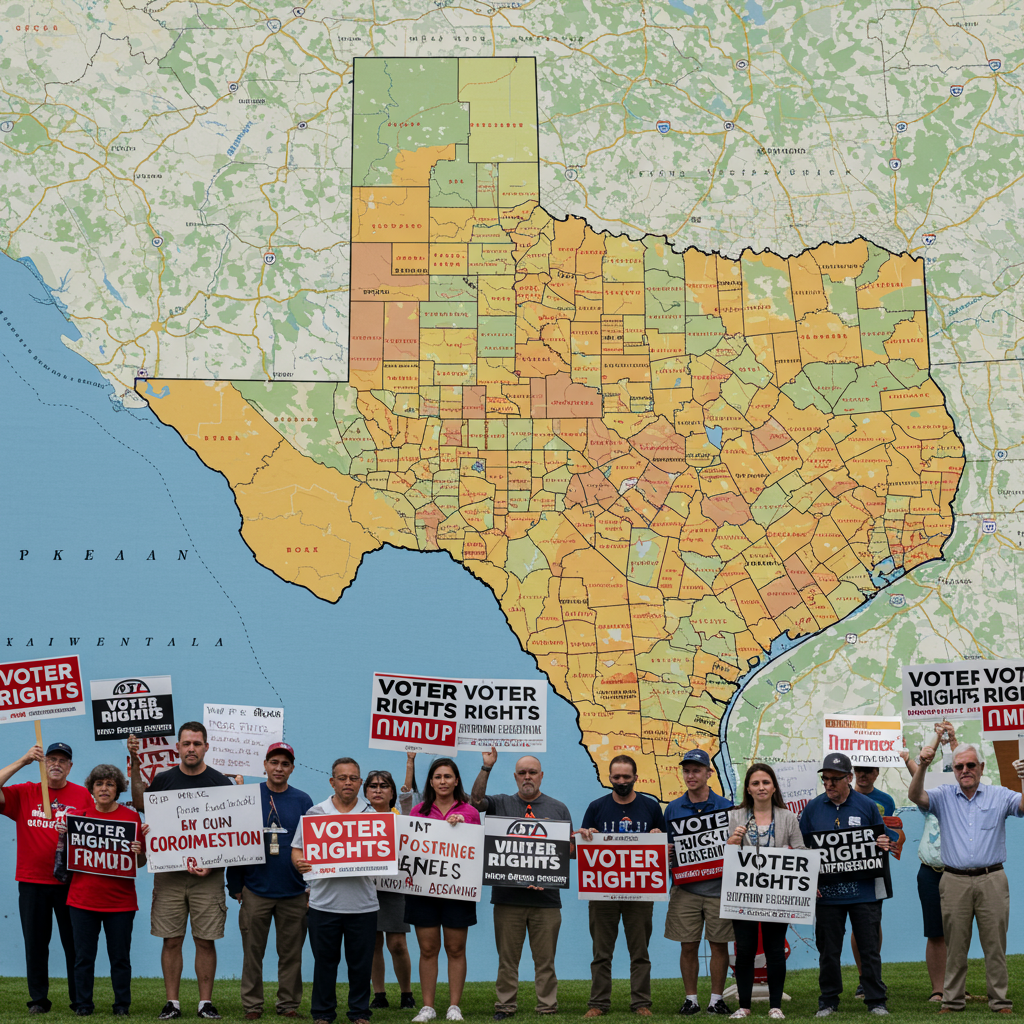Texas has plunged into another heated legislative standoff as over 50 Democratic lawmakers have fled the state, prompting the Texas House to issue civil arrest warrants. This dramatic “quorum break” aims to derail Republican efforts to redraw congressional maps, a move Democrats decry as a partisan power grab that threatens minority voting rights. The unusual mid-decade redistricting attempt, strongly backed by Governor Greg Abbott and reportedly pushed by former President Donald Trump, seeks to significantly bolster the Republican presence in the U.S. House of Representatives. This high-stakes political maneuver has ignited a fierce debate about legislative power, democratic integrity, and the future of electoral representation in the Lone Star State.
The Core of the Texas Standoff
The current political crisis in Texas centers on a special legislative session called by Governor Greg Abbott, ostensibly to address critical state issues like disaster recovery and human trafficking. However, the primary catalyst for the Democratic exodus is the proposed redrawing of Texas’s congressional districts. Republicans, holding a clear majority in the House, are pushing for new boundaries designed to net an additional five GOP seats, building on the 25 Republican seats secured under the 2021 map. Democrats assert that this Texas redistricting plan is overtly gerrymandered, specifically targeting and diluting the voting power of Black and Latino Texans in urban hubs like Austin, Houston, and Dallas.
Quorum Break: A Tactic Explained
A “quorum” refers to the minimum number of legislative members required to be present for a chamber to conduct official business and advance legislation. In the Texas House, a two-thirds quorum, or 100 members, is necessary. By deliberately absenting themselves from the chamber, the more than 50 Texas House Democrats effectively denied the Republican-dominated House the necessary headcount, preventing a vote on the contentious redistricting bill. This tactic, known as a “quorum break,” is a rare but potent tool employed by minority parties to obstruct legislative proceedings when they lack the votes to defeat a bill outright. It forces a legislative standstill, hoping to run out the clock on the special session’s 30-day limit.
The Immediate Fallout: Warrants and Threats
Following the Democratic walkout, House Speaker Dustin Burrows immediately initiated a “call of the House,” which mandates all members to remain within the chamber unless excused. With only 90 members present, falling short of the required quorum, the House voted 85-6 to authorize civil arrest warrants for the absent lawmakers. Speaker Burrows swiftly signed these warrants, empowering the chamber’s sergeant-at-arms and state troopers to locate and bring the legislators back to the Capitol. Governor Greg Abbott publicly supported these actions, mobilizing the Texas Department of Public Safety (DPS) to assist in the effort. He condemned the absent Democrats for “shirking their responsibilities” and abandoning their legislative duties, emphasizing the urgency of other issues like flood relief.
The Power Play: Redistricting’s High Stakes
The push for new congressional maps in Texas is more than a local dispute; it carries significant national implications. With Republicans holding a slim majority in the U.S. House of Representatives, gaining additional seats from a large and growing state like Texas could solidify their control ahead of upcoming midterm elections. The proposed congressional map modifications are overtly partisan, drawn to favor districts where Donald Trump garnered at least 10 percentage points more votes in the last election. This aggressive pursuit of partisan advantage underscores the high stakes involved in the current legislative battle.
Republican Ambitions: Cementing Control
From the Republican perspective, the mid-decade redistricting is a legitimate exercise of legislative power, aimed at optimizing electoral outcomes in a rapidly changing state. Governor Abbott, spurred by former President Trump’s team, directed lawmakers to undertake this process. Speaker Burrows underscored the importance of advancing all legislative business, not just redistricting, portraying the Democratic walkout as an evasion of duty that delays critical work on disaster recovery and human trafficking. Some Republicans even advocated for further punitive measures, such as stripping Democrats of committee roles or seniority, or even redrawing state House maps to disadvantage Democratic districts.
Democratic Resistance: A Moral Stand
The Texas House Democrats, led by House Democratic Caucus Chair Rep. Gene Wu, have framed their walkout as a decision of “absolute moral clarity.” They accuse Governor Abbott of using a “racist map” to “steal the voices of millions of Black and Latino Texans,” effectively leveraging the legislative process for a “corrupt political deal.” They argue that focusing on partisan redistricting amid severe issues like deadly floods is a “bait-and-switch” that holds grieving families “hostage in a political game.” Their defiance, echoed by the phrase “Come and take it,” signals their firm resolve to remain out of state until the special session expires, thereby preventing the passage of the controversial map.
Legal Labyrinth: Understanding the Repercussions
While the issuance of arrest warrants might sound drastic, the immediate legal repercussions for the absent Texas Democrats are complex and largely symbolic due to their out-of-state locations. Legal and ethics experts have largely cast doubt on the feasibility of Governor Abbott’s more severe threats.
The Symbolic Nature of Arrest Warrants
The civil arrest warrants, while authorizing state troopers to detain and bring lawmakers to the Capitol, are only enforceable within Texas state lines. The majority of the absent Democrats have traveled to Illinois, New York, and Massachusetts, effectively placing them beyond the immediate reach of Texas law enforcement. This mirrors a similar 2021 quorum break when Democrats traveled to Washington, D.C. At that time, legal challenges to such warrants resulted in the Texas Supreme Court upholding the legislature’s right to “quorum-forcing” in response to “quorum-breaking,” citing House rules. However, practical enforcement remains limited to those who might return to Texas. These warrants do not carry civil or criminal charges from the arrests themselves.
Financial Penalties and Vacant Seat Threats
Beyond the warrants, the absent lawmakers face immediate financial penalties, incurring fines of $500 for each day they miss. These fines were codified into House rules after the 2021 quorum break, and crucially, updated rules explicitly prohibit the use of campaign contributions to pay these penalties. Governor Abbott also escalated the stakes by threatening to initiate a legal process to declare the absent Democrats’ seats vacant if they did not return by a specified deadline, citing an “abandonment or forfeiture” of office. However, legal experts widely consider this threat unprecedented and likely futile. They emphasize that the Governor lacks unilateral power to remove elected officials, and such action would necessitate individual lawsuits and judicial intervention, which judges would likely be reluctant to undertake. Speaker Burrows himself remained non-committal on the viability of this extreme measure.
Bribery Allegations: A Contentious Claim
In an even more controversial move, Governor Abbott announced a Texas Rangers investigation into potential bribery law violations by Democratic lawmakers and anyone who financially assisted their travel out of state. He alleged it would be bribery if any lawmaker accepted money “to perform or to refuse to perform an act in the legislature.” Texas Attorney General Ken Paxton echoed this, stating, “these liberal lawmakers are not above the law.” However, legal experts have expressed significant skepticism regarding the feasibility of proving such claims in court, noting that bribery statutes typically require clear proof of intent or a quid pro quo. They suggest it would demand an “aggressive” and “muscular read of the bribery statute” by a prosecutor, with a successful prosecution being “very, very unlikely.”
Historical Context and Future Implications
The current standoff is not an isolated incident but rather the latest chapter in Texas’s contentious legislative history, particularly concerning voting rights and redistricting.
A Familiar Playbook: The 2021 Precedent
The 2025 quorum break serves as a direct echo of the 2021 walkout, when a majority of Texas House Democrats traveled to Washington, D.C., to protest proposed GOP voting restrictions. That prior action established the precedent for the use of civil arrest warrants and daily fines. The Texas Supreme Court’s subsequent ruling affirmed the legislature’s power to compel attendance, laying the groundwork for the current enforcement efforts. This repeated tactic highlights the deep partisan divisions within the state and the lengths to which minority parties will go to obstruct legislation they deem fundamentally harmful.
National Ramifications and the Road Ahead
The ongoing Texas redistricting battle is a microcosm of a broader national trend where both Republican and Democratic parties utilize gerrymandering to solidify their power bases. While Texas Republicans are aggressively redrawing maps, states like Illinois, New Mexico, and Nevada have seen Democrats also engage in partisan redistricting. Conversely, other Democratic-controlled states such as New York, California, Colorado, and Washington have adopted non-partisan or independent commissions for the redistricting process. The rarity of a mid-decade map redraw, typically occurring only after a decennial census, underscores the urgency and political motivation behind Texas’s current special session. The Democrats’ commitment to remain out of state until the special session expires in two weeks sets up a tense waiting game, with Governor Abbott retaining the power to call new special sessions indefinitely if the legislative work remains unfinished. The outcome of this standoff could set a precedent for future legislative battles across the nation.
Frequently Asked Questions
What is a quorum break and why did Texas Democrats do it?
A quorum break is a legislative tactic where a sufficient number of members of a legislative body intentionally absent themselves to prevent the chamber from reaching the minimum number of members (a quorum) required to conduct official business. In Texas, 100 members are needed for a quorum in the House. Texas Democrats executed this strategy to block a Republican-backed bill to redraw the state’s congressional maps. They view this proposed Texas redistricting as an intentionally gerrymandered plan designed to dilute the voting power of minority communities and unfairly increase Republican seats, labeling it an attack on democracy and racial equity.
Where did the Texas Democrats go, and why does it matter for arrest warrants?
The majority of the over 50 Texas House Democrats who broke quorum traveled to out-of-state locations, primarily Illinois, New York, and Massachusetts. Their physical departure from Texas is crucial because the civil arrest warrants issued by the Texas House are only enforceable within Texas state lines. By leaving the state, the lawmakers placed themselves beyond the immediate jurisdiction of Texas law enforcement. This makes the warrants largely symbolic, as state troopers cannot legally cross state lines to apprehend them without federal cooperation or extradition processes, which are not applicable for civil warrants.
What are the potential consequences for the Texas Democrats who left the state?
The absent Texas House Democrats face several potential consequences for their actions. Immediately, they incur daily fines of $500 for each day they miss legislative sessions, and new rules prohibit using campaign funds to pay these penalties. While civil arrest warrants have been issued, their enforcement is limited to within Texas. Governor Abbott also threatened to declare their seats vacant through a legal process, and to investigate them for bribery if they accepted money to facilitate their walkout. However, legal experts have largely expressed skepticism about the feasibility and legality of the “vacant seat” and “bribery” threats, stating they would be difficult to prove and enforce in court without significant judicial intervention.
Conclusion
The ongoing legislative standoff in Texas represents a critical juncture in the state’s political landscape, highlighting the intense partisan struggle over electoral power. The Texas redistricting debate, temporarily stalled by the Democratic quorum break, underscores the deep divisions within the state and the national implications of gerrymandering. While the immediate consequences for the absent Texas House Democrats are limited due to their out-of-state locations, the symbolic nature of the arrest warrants and the escalation of legal threats reflect the high stakes of this political chess match. As the special session clock ticks down, the outcome of this unprecedented confrontation will undoubtedly shape Texas politics for years to come, potentially setting a precedent for legislative tactics and the enforcement of quorum rules nationwide.




